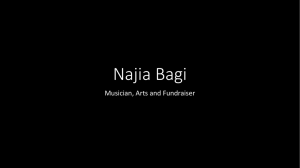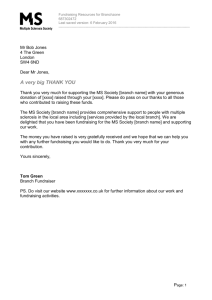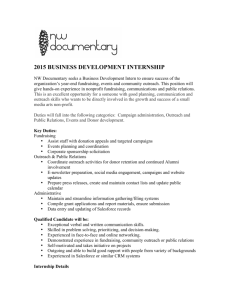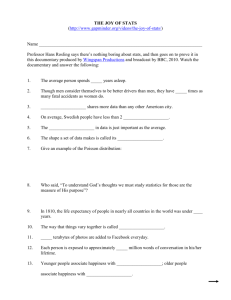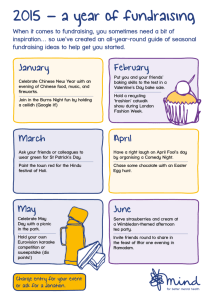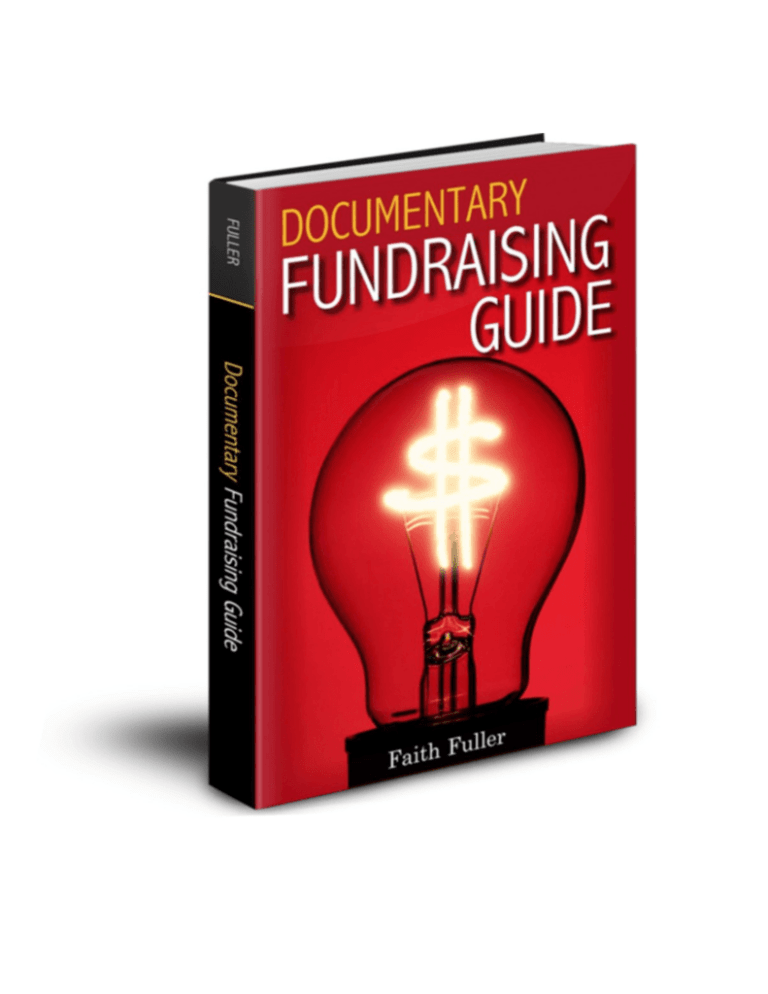
Documentary
Fundraising Guide
L e s s o n s F r o m A F i l m m a k e r | S i m p l e S t e p s To G e t
C a s h F l o w i n g Fo r Yo u r F i l m
Faith Fuller
published by
Desktop Documentaries, Inc.
Documentary Fundraising Guide
published by Desktop Documentaries
© 2012 by Faith Fuller
Cover Art Design by Ina Peters
Published in the United States of America
ALL RIGHTS RESERVED
No part of this publication may be reproduced or transmitted in
any form or by any means – electronic, mechanical, photocopying,
recording, or otherwise – without prior written permission.
For information, contact:
Desktop Documentaries Inc.
info@desktop-documentaries.com
www.desktop-documentaries.com
CONTENTS
INTRODUCTION........................................................................................................................................ 1
SECTION I – The Prep
1. Getting Your Head Straight............................................................................................................... 5
2. Why People Donate to Documentaries..................................................................................... 12
3. Your Fundraising Strategy............................................................................................................. 16
4. Where's The Money?........................................................................................................................ 24
SECTION II – The Tools
5. Documentary Fundraising Tool Kit............................................................................................ 33
6. Social Media For Filmmakers....................................................................................................... 40
7. Grabbing A Headline: News Media & Press Releases.........................................................51
8. Pitching Your Idea: Crafting An Elevator Pitch and Log Line...........................................56
9. How To Write A Documentary Treatment And Proposal..................................................65
10. Adding It Up: Documentary Budgeting Guide ....................................................................79
11. Tips For A Sizzling Fundraising Trailer.................................................................................89
12. What's A Fiscal Sponsor And Why Do I Need One? .........................................................96
13. Internet 101: Building A Documentary Website.............................................................103
iv
SECTION III – The Ask
14. Major Donors | Partnering With Wealthy Individuals..................................................118
15. Mega Millions: Grants and Foundations.............................................................................134
16. Reaching The Masses: Crowdfunding Campaigns..........................................................143
17. Raising Money Through E-mail Campaigns......................................................................163
18. Direct Mail: The Power Of Fundraising Letters...............................................................172
19. Quick Reference Guide: Fundraising Clues and Quick Tips........................................182
20. Summary & Resources............................................................................................................... 185
v
Though the barriers of life seem formidable, we find
when we challenge them that they have no will.
~ Robert Brault
vi
INTRODUCTION
Your Treasure Map
“If you can imagine it, you can achieve it;
if you can dream it, you can become it.”
~ William Arthur Ward
When you decide to make a documentary, you
are launching a journey that will forever change
your life.
Whether you're just starting to dream about
your project or you're in the middle of shooting
or editing, you have probably discovered that
making documentaries requires not only
passion, perseverance and hard work, but also
cold hard cash – sometimes, lots of it.
Welcome to the world of fundraising – one of the most challenging (and often
unexpected) aspects of filmmaking.
Fundraising is like a treasure hunt. One clue leads to another and then to another.
Sometimes one clue will lead you straight to the treasure, but often you'll have to
jump through many hoops and follow many clues or leads.
Consider this guide your personal Treasure Map for documentary funding.
Here's the great news. There's never been a better time to be a filmmaker. The
relatively low cost of film production makes filmmaking more easily accessible than
at any time in history. And thanks to online fundraising tools, crowdfunding and
social media networks, opportunities to find and connect with potential sources of
funding have never been more abundant.
My goal in writing this book is to take the mystery (and fear!) out of fundraising and
provide solid clues and tangible actions you can begin implementing right away. I
guarantee there is money out there for your film if you're just willing to search for it.
1
INTRODUCTION Your Treasure Map
Who Is This Guide Book For?
This guide is for anyone with the desire and passion to make a documentary who is
in need of funding to start, continue or complete their film. The primary assumption
is that the documentary or video project is a non-profit endeavor.
What Will You Learn?
•
Section 1 covers the prep-work you must do before you can even begin the
process of asking for funding – things like setting goals, researching and
creating a fundraising strategy.
•
Section 2 covers the nuts and bolts of setting up a fundraising “hub” for your
documentary. You'll get step-by-step instructions on how to create all the
necessary fundraising tools to help bring in funding, things like a fundraising
trailer, a budget and a proposal.
•
In Section 3, you'll learn the core methods of raising funds including how to
find and approach individual major donors, how to conduct a successful
crowdfunding campaign and how to find and apply for grants.
How To Use This Guide
It's best to read this guide from start to finish to understand the “flow” of
fundraising, however each chapter stands on its own as well. Feel free to skip
through and focus on just the parts you need to learn right now and then refer back
as needed.
This guide is effective as a stand-alone fundraising tool or as part of the
Documentary Fundraising Tool Kit which includes a documentary proposal
template, two budgeting templates, a fundraising check-list, a list of 25 fundraising
ideas and a “Top 100 Film Funders” list. To learn more about these items and the kit:
www.desktop-documentaries.com/store.html
2
INTRODUCTION Your Treasure Map
Why Did I Write This Guide?
As the founder and publisher of Desktop-Documentaries.com, I have learned that
funding is often THE #1 struggle for filmmakers. I wanted to do something to help!
As a documentary producer myself, I know just how daunting fundraising can be.
I wanted to create a simple step-by-step guide to help demystify the fundraising
process and break through some of the common barriers that prevent so many
deserving filmmakers from getting the funding they need to share their stories.
Throughout this book you will find dozens of very specific things you can begin
implementing right away to start raising cash for your film.
This is the book I WISH I'd had when I first started making documentaries!
In addition to sharing lessons from two decades of my own personal filmmaking and
fundraising experience, I've spent the last year meticulously researching and writing
this book – mapping out the absolute best information, tools and resources to help
you raise money for your film.
Your Treasure Hunt
As you set off on your journey, above all, remember that fundraising is about
RELATIONSHIPS – both in person and online. And it's about COLLABORATION. It's
about making genuine connections and friendships and keeping your lines of
communication open with all kinds of people who can be a part of helping you make
your film a reality.
People support people they know, like and trust.
Start reaching out – share your vision and your
dream with anyone and everyone you meet –
and you will see the clues to your fundraising
treasure unfold.
3
SECTION I – The Prep
1
-------------_____________________________________________
Getting Your Head Straight
"Nobody can dim the light which shines from within."
~ Maya Angelo
Documentary filmmaking is part art, part business and part journey of the soul.
Are you prepared for all sides of the filmmaking profession?
Morrie Warshawski is considered a fundraising guru in the documentary filmmaking
world. He won't even TALK to a filmmaker about fundraising until they have their
“head straight”. He asks every filmmaker three questions:
•
What are your CORE VALUES (as a person) – What things
do you value the most in life? Examples include
curiosity, creativity, freedom, intelligence, etc.
•
What is your MISSION STATEMENT (as a filmmaker) –
What are you trying to accomplish with your filmmaking?
•
What is your VISION STATEMENT (as a filmmaker) –
What will your life as a filmmaker look like in 3 years?
Warshawski says that answering the above questions can have a dramatic impact on
the ability for a filmmaker to attract and raise money for their projects.
In his book, Shaking The Money Tree, Warshawski provides an example of a
filmmaker struggling with fundraising – she'd been approaching foundations
offering to produce a film about whatever subject they felt was important. But once
she worked through her mission statement and re-aligned her true values with the
right project, she went on to raise $1-million for a film.
5
Getting Your Head Straight
What Is Your Relationship With Money?
Do you consider money your friend or your enemy? Do you have a poverty mindset
or a mindset of abundance? Are you comfortable asking people for money?
Or stated another way, are you comfortable RECEIVING money.
You might say to yourself, “Of course I am comfortable receiving money. Who doesn't
want money!” But you might be surprised what your brain is REALLY telling you
about money. Subconsciously you may not think you are worthy of receiving money
or you have somehow learned in your childhood that money is evil.
Artists in particular seem especially uncomfortable with money and the business
side of the industry.
Are you secretly sabotaging yourself and blocking people from giving you money?
According to the NLP (Neuro-Linguistic Programming) Institute of California, here
are some common unconscious beliefs about money:
"You have to work hard to make money"
"Money is hard to manage"
"Money is something I feel guilty about having"
"Money is a very personal or private matter"
"Money is very difficult to get"
"Money is something I don't deserve"
"Money is the root of all evil"
"Money causes pain"
Can you relate to any of the above statements?
6
Getting Your Head Straight
Right now, get a pen and paper and jot down three statements that represent your
core beliefs about money. What messages did you get from childhood about money?
1. Money Belief #1 ___________________________________
2. Money Belief #2 ___________________________________
3. Money Belief #3 ___________________________________
This is important, because how you feel deep in your soul about money will directly
impact your fundraising efforts.
As Carol Dean of From The Heart Productions tells filmmakers, “Get very clear on
any confusion you have about attracting or receiving money.” Your fundraising
success DEPENDS on it.
To dig deeper on the topic of money psychology, try these books:
◦
“Mind Over Money” by father-son team of Ted and Brad Klontz
◦
“Think and Grow Rich” by Napoleon Hill
◦
“Excuse Me, Your Life Is Waiting” by Lynn Grabhorn
Can You Handle Rejection?
Fundraising is perhaps more of a mental game than anything else. Actors and
fundraisers have a lot in common as they probably hear the word “no” far more
often than “yes”.
Are you the type of person who is easily discouraged and will give up at the first sign
of difficulty? Or can you push past the road blocks?
Keep in mind that just because you get turned down for money doesn't mean your
project isn't worthwhile. People don't part with their money easily, even foundations
whose sole purpose is to give away money! For example, there are many reasons
why great projects don't get funded. Perhaps the application wasn't filled out just
7
Getting Your Head Straight
right, maybe the judges couldn't relate to the subject matter, perhaps they funded a
similar project the previous year and are looking for something new.
Fundraising expert Marc Pitman says that getting a “no” can actually be a GOOD sign
because it means the person is engaging with you and may simply need more time
and/or information to consider your request. Find out why they said no, let them
know you understand and ask them if you can keep them posted on the project.
Above all, let them know you appreciate their time and consideration.
Attitude of Gratitude
Do you believe the things you SAY and THINK (consistently) become reality?
If you continually think of yourself as a failure and say things like “I'm not
good at anything,” or “no one's going to give money to this project,” what do
you think is going to happen? But what if you say to yourself, “People are
going to love the idea of my film and they are going to want to support it.”
Isn't that a better intention to put into the world?
One of the most profound books on this topic is Excuse Me Your Life Is Waiting: The
Astonishing Power of Feelings by Lynn Grabhorn. I highly recommend it if you're
ready to transform your life and bring success to your documentary project.
Many years ago, I attended an event where Hillary Clinton was a guest speaker. The
one thing I remember in particular from her speech is that she spoke about the
“discipline of gratitude”. I was totally blown away. I had never thought of gratitude
as being a habit or discipline. What a simple, yet amazing and profound idea.
Your Goals
Goals are the foundation of your life and career. If you don't know where you're
going, how are you going to get there? To me, life is made up of all the stuff in
between this moment and your goals. In other words, it's the JOURNEY. So your
goals are simply the guide posts of your life... little arrows that say, “Life... that way!”
Your goals are your dreams and they propel you forward.
CNN mogul Ted Turner once said “Set your goals higher than you can achieve.” Big
goals provide excitement, energy and a sense of awe. (It's hard to get excited about a
wimpy uninspiring goal.) As the saying goes, “shoot for the stars and you'll hit the
moon.”
8
Getting Your Head Straight
Your Goals - Assignment #1:
First, what are your big LIFE goals? Is it to get married and have three kids? Sail
around the world? Make 50 films by the age of 50?
Right now, take out that pen and paper again or pull up a blank page on your
computer. Brainstorm all your goals in no particular order. At this point, don't
worry if they are personal or professional goals. Just make your list.
•
List your BIG goals for this year
•
List your BIG goals for the next three years
•
List your BIG goals for your WHOLE life
Your Goals - Assignment #2:
Next, write down your goals for your current/next documentary project.
•
What progress do you hope to make on your documentary this year? When
do you want to have your documentary completed?
•
What is your overall goal for the documentary project? Is it to create a small
artsy film that will showcase in small independent movie theaters and on the
internet? Is it to create a high production quality film that can be broadcast
on national television? Is it simply to get “something” made just for practice
or to prove to yourself you can tell a story? Is it to increase awareness about
a certain cause or issue or is it purely to entertain?
•
What is your fundraising goal? How much money do you need to raise and by
when?
Each BIG goal then needs to be broken down into smaller bite size goals.
Setting goals can be a great reality check. It's no longer a pie-in-sky-thought or idea.
It's a way to really get down to the nitty gritty of exactly how to turn your dreams
into reality. So, if your goal is make a documentary and have it completed within
two years, you'll need to come up with a schedule of exactly what needs to happen to
reach that goal. You'll create what's called a production schedule which lists target
dates and required tasks. (See a sample production schedule in the Documentary
Proposal Template)
9
Getting Your Head Straight
Visualizing
Visualization is extremely powerful. Since you're in filmmaking, you perhaps know
this better than anyone!
Australian Ryan Higgins developed the idea of “Mind Movies”. He discovered that
the ACT of creating and editing a little movie/slideshow about how he wanted his
life to look had a powerful impact on whether or not his dreams came true. Say for
example he had a dream of living in Hollywood and making movies. He would
literally get a video or photo of himself driving in a car saying he was “off to
Hollywood”.. and then he would show images of Hollywood and people making
movies and saying “There I am, making movies in Hollywood.” Or “There I am on the
red carpet winning an Oscar for my documentary.”
Courtesy: Mind Movies
In the context of this book about making documentaries and raising money, SEE
yourself receiving the amount of money you need in order to make your
documentary. Write down the exact amount of money you need to make your
documentary and when you need it. If you need $10,000 right now to create the
trailer, write that down! It's not necessarily important to know where the money
will come from.. just visualize it coming to you.
This is where a budget and proposal can be POWERFUL tools in making your
documentary a reality. Creating those documents at first may seem like a boring and
unnecessary process. But what those documents do is force your brain to think
through all the scenarios – to VISUALIZE how your documentary will be made,
where you will be shooting, how it will be written/edited and ultimately where your
film will be seen by an audience.
10
Getting Your Head Straight
--_--Final Thoughts | Recap
•
Visualize your success and BELIEVE. In your heart, know that the money will
come and your film will get made.
•
Take the time to write a mission statement, vision statement and set goals.
Setting the proper foundation can dramatically impact your fundraising
success.
•
Your film is about something bigger than yourself. When you ask for money,
remember that.
•
Always be thankful for even the smallest gesture of support. Gratitude is
contagious and will attract more goodness toward you.
11
2
------------_____________________________________________
Why People Donate to
Documentaries
“In good times and bad, we know that people give because you meet needs,
not because you have needs.”
~ Kay Grace
I admit this issue used to baffle me. Why would someone want to give their hard-
earned money to help make MY dream a reality? Turns out, it wasn't about me at all!
(Or at least not completely.)
People donate money for all kinds of reasons and it's important to understand WHY
people give so that you can know HOW to ask them for support.
Here are the top reasons people give to documentary projects:
•
PERSONAL: They have a personal connection to YOU. These are usually
friends, colleagues and family members. It doesn't matter if you're doing a
documentary about french fries or the economy, they are supporting YOU and
it makes them feel good to support a loved one, solidify their relationship
with you and be part of something positive.
12
Thank you for reading a sample
of the Documentary Fundraising
Guide.
There's lots more!
Click here to purchase the entire e-book:
www.desktop-documentaries.com/documentary-fundraising-guide.html
13
Additional Documentary Fundraising Tools
from Desktop Documentaries:
•
•
•
•
•
•
Documentary Fundraising Tool Kit
25 Fundraising Ideas for Documentary and Video Projects
Documentary Proposal Template
Documentary Budgeting Template Pack (2 budgets, guide)
Documentary Fundraising Check-List
Top 100 Film Funders (included in tool kit)
Visit: www.desktop-documentaries.com/store.html
14



